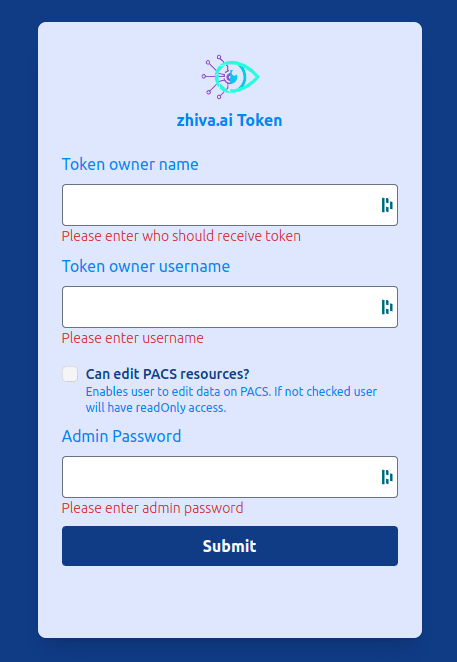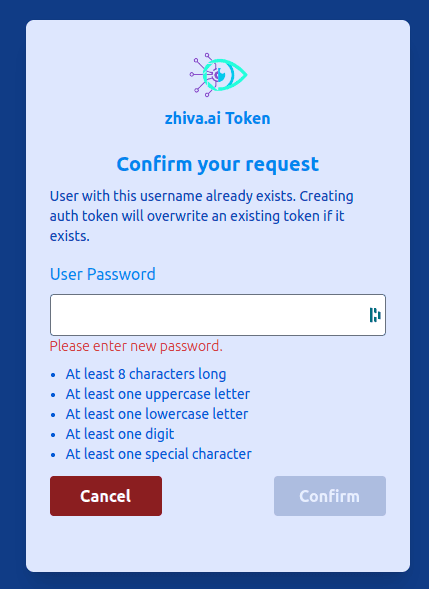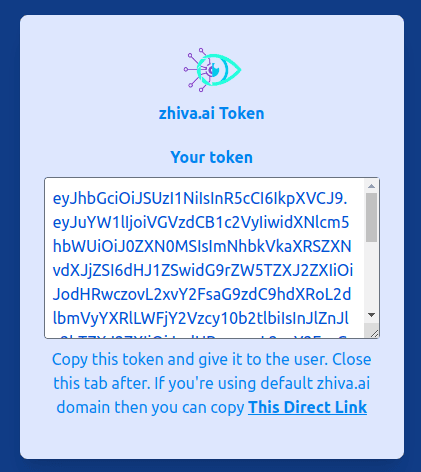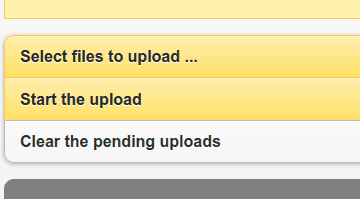This is an advance PACS configuration that might not be required if you're using PACS for your local project.
TLDR:
If you didn't get your TSL certificate file execute Generate local TSL first.
git clone https://github.com/zhiva-ai/pacs-token-server.git
docker-compose upRequirements
Before we start please make sure your server has access to:
- Unix-base shell
- Docker
- Docker Compose
- OpenSSL
Get the server code
You can either clone this repo
git clone https://github.com/zhiva-ai/pacs-token-server.gitor download it directly from ZhivaAI JWT PACS server.
Generate local TSL certificate
(only once every 365 days)
If you already have the
.crtand.keyfiles do not generate them again. Go straight to Build the server section and run your server with existing certificate.
Before we starty storing data on the server we have to secure the connection between the server and the viewer. We're going to use Transport Layer Security (TSL). First, we have to generate certificate (.crt) and key (.key) files. Because we're doing it from the local server we're going to use OpenSSL (we don't need external party to sign certificate, if you want to use it on the external server you should sign with something like Let's Encrypt).
To generate local certifiate please execute following command in the terminal window (make sure openssl is installed).
openssl req -x509 \
-nodes -days 365 \
-newkey rsa:2048 \
-keyout zhiva.key \
-out zhiva.crt \
-subj "/C=PL/L=Wroclaw/O=Your Company, Inc./CN=localhost"Change -subj to describe your organization:
C- country code (2 letter code)L- location (city name)O- organization nameCN- full domain name (uselocalhostfor local servers)
Then copy .crt file as trusted certificate:
cat zhiva.crt > trusted.crtSetup your local server
At this point you should have 2 .crt files and 1 .key file. Check this by calling
ls *.{crt,key}from your main directory. It should return following result trusted.crt zhiva.crt zhiva.key.
If one of those files is missing go back to Generate local TSL certificate section and make sure you have all of them.
Setup JWTs
Generate private and public tokens
openssl genrsa -out jwt_priv.pem 512
openssl rsa -pubout -in jwt_priv.pem -out jwt_pub.pemGenerate server settings
Run setup docker image
docker-compose --file ./setup/docker-compose.yml build zhiva_setup
docker-compose --file ./setup/docker-compose.yml run zhiva_setupYou should be prompted for admin password (Enter the admin password: ). Store that password in your password management software becuase you won't e able to read it directly.
Setup configuration should be stored in .env file.
Build the server
For Macbook M1/M2 (any Apple Silicon chips):
- Go to
./auth-server/Dockerfile - change
FROM node:18-alpinetoFROM node:18
Run:
docker-compose upFor everyone else (including macbooks with Intel chips):
docker-compose upAfter starting the server you should be able to access localhost/zhiva/app/explorer.html#upload where you can upload your files.
Important!!!
You might be prompted with the message about invalid SSL certificate. This is caused by using OpenSSL to generate certificate for
localhostand that certificate has no 3rd party that confirms its authenticity. It's fine for local network but remember to use proper certificate if the server is accessible from outside your network.
User accounts
Warning !!!
Firefox has an issue with origin forwarding when "JavaScript code is running with enhanced privileges" which translates to "when running on not signed certificate website". This cannot be helper so please use another browser for things like generating tokens (e.g. Chrome).
For every user in your system you have to generate new user account. To do this, you should access https://localhost/auth/token and enter required fields. Admin Password is the password you've entered in Generate server settings.
Enter user's new password
At the end you'll be presented with one-off AuthToken.
Authenticating users with token
Auth Token is used to sign-in user in zhiva application. You can use it in Zhiva login, or you can generate one-off login URL:
https://alpha.zhiva.org/auth/oauth?token=YOUR_AUTH_TOKENThis link can bo modified if you're using different domain/subdomain than default alpha.zhiva.org. Just replace the domain and leave the rest of the path the same. Link for the default domain is also stored in This Direct Link just below textfield with token.
Access to orthanc explorer
Because this version of the server works with tokens you have to generate one in order to access local explorer. To generate token you have to go through the proces from https://localhost/auth/token again. At the end just copy the token and access explorer by adding this token as query parameter. Your URI should look like this:
https://localhost/zhiva/app/explorer.html?token=YOUR_TOKEN_HERERemember to give your token "Can edit PACS resources?" access, otherwise you won't be able to modify anything on the server.
This token expires in 24h or when the user uses it to login.
Access from within internal network
If you have more than one computer inside your network (or VPN connection), then you can share the server settings with them. To check the server address please run the following command:
Linux or Mac:
ifconfigWindows
ipconfigand look for the setting with the inet value that starts with 192.168.. That should by your address in the local network. You should be able to access the upload page from https://192.168.x.x/zhiva/app/explorer.html.
Upload your DICOMs
Go to localhost/zhiva/app/explorer.html#upload?token=YOUR_TOKEN_HERE and click on Select files to upload.
After selecting all the DICOMs click Start the upload to store them on the server.
All DICOMs are stored in Docker's persistent volume so even after restarting the server all your files are still accessible.
Now you should be able to access studies which were generated after uploading DICOM files. List of studies is available at https://localhost/zhiva/app/explorer.html#find-studies.
FAQs
- "How to use this server with your DICOM viewer?"
Detailed instruction is described in Managing servers inside the DICOM viewer guide.
- "Why my server doesn't accept very large DICOM files?"
There is an maximum file size setting inside server config. If you want to change that please go to ./nginx.conf and modify:
client_max_body_size 2000m;Customization
URL
You're able to change server url by modifying two settings:
orthanc.json- inner server settingsnginx.conf- main server settings
Inside orthanc.json go to DicomWeb attribute and change Root property. This property is responsible for path to dicom-web server (the one used by the viewer).
// orthanc.json
{
"DicomWeb": {
[...]
"Root": "/pacs/"
[...]
}
}If you want to change main path to your server you have to modify the second setting (nginx.conf). Path is defined as a location and rewrite (reverse-proxy). Change following lines
// nginx.conf
[...]
location /zhiva {
[..]
rewrite /zhiva(.*) $1 break;
}
[..]you can change it to:
// nginx.conf
[...]
location /serv {
[..]
rewrite /serv(.*) $1 break;
}
[..]and access your server at https://localhost/serv/...
Storage
Currently, all the data are stored in Docker's persistent volume. This is volume created by Docker itself. If you want to specify the path please follow the instruction from the Docker Docs about setting up directories as volumes.



